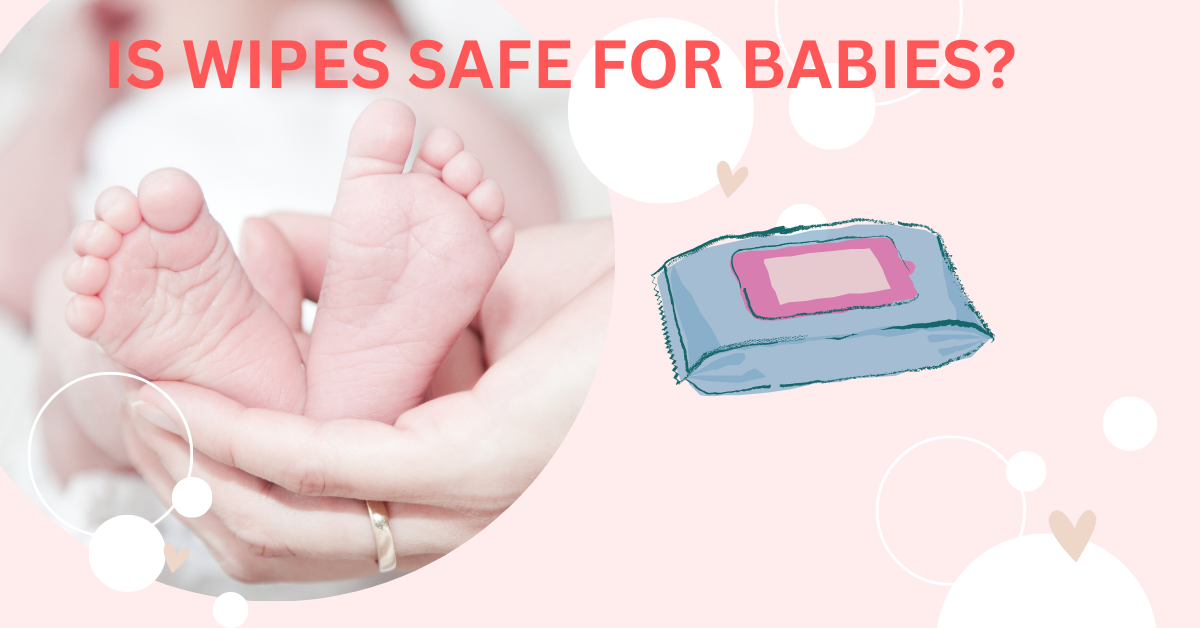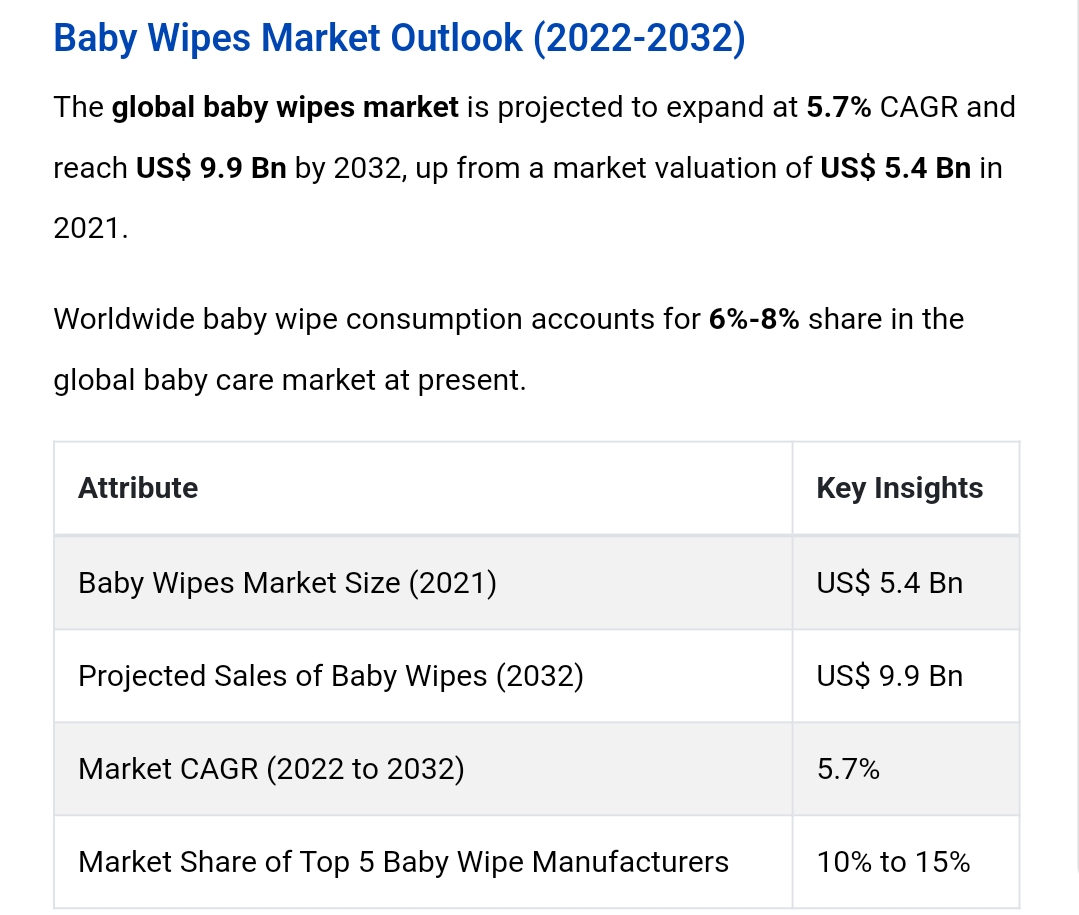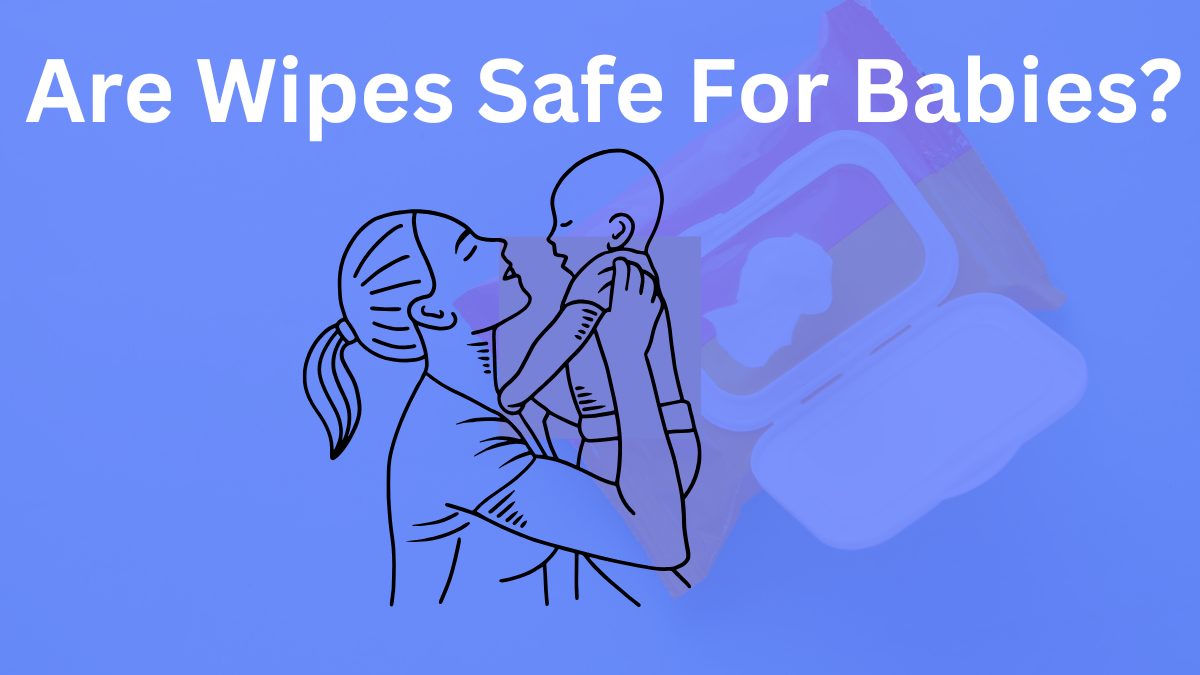Is wipes safe for babies? Yes, because it’s specially designed to soothe sensitive skin. But there are some precautions to be taken while purchasing them.

Table of Contents
1. What is baby wipe?
A baby wipe is a specially designed moist cloth made to clean the sensitive skin of a newborn baby. It is commonly used to clean the baby’s bottom during a diaper change. It is also used to wipe the baby’s hands, eyes and face. Baby wipes are often made with soothing ingredients such as aloe Vera and chamomile to make them gentle.
This makes them useful for preventing irritation to the baby. There are many types of wipes available in the market, including biodegradable, hypoallergenic and fragrance-free. These meet the different needs and preferences of the baby.
2. What should be the essential safety measure available in the wipes?
Hypoallergenic and dermatologically tested, free from harmful chemicals, Ph balance, natural ingredients and biodegradable should be essential safety measures available in wipes.
Ensuring safety parameters is paramount when choosing the right baby wipes.
So, here are some essential safety tips to look out for:
- Hypoallergenic and dermatologically tested: These types of wipes should be tested to ensure that they do not cause allergies or skin irritation.
- Free from harmful chemicals: Ensure that the wipes are free from alcohol, parabens, phthalates, and artificial fragrances.
- pH-balanced: The pH level of the wipes should match the natural pH (7) of the baby’s skin.
- Natural ingredients: Look for wipes made from natural and organic ingredients like aloe Vera, chamomile, and vitamin E. These are gentle and nourishing for the baby’s skin.
- Biodegradable: Choose biodegradable wipes to ensure that they are eco-friendly and safe.
By following these safety parameters, you can choose better wipes for your baby so that the baby’s skin can be properly cared for.
3. Are disinfectant wipes safe for babies?
Disinfectant wipes are effective at killing germs, but they are not always safe to use directly around babies.
Here are some guidelines to follow:
- Check the ingredients: Look for wipes that are free of harsh chemicals like alcohol, bleach, and fragrances. These ingredients are especially harmful to babies.
- Wash surfaces: If you use disinfectant wipes on surfaces that your baby may touch, be sure to rinse the area with water afterward to remove chemical residue.
- Use baby-safe options: Choose baby-safe cleaning products like these that are specifically formulated to be gentle and non-toxic on baby skin.
- Read the label: Always read the statutory warning label to understand the proper use and potential risks of any disinfectant product.
- DIY solutions: Consider making your own cleaning solutions using safe ingredients like vinegar and baking soda, which are considered effective and non-toxic.
By following these precautions, you can create a clean environment for your baby without exposing him to harmful chemicals. Always prefer better designed products to ensure a healthy and safe space for your little one.
4. How many types of wipes are available in the market?
There are many types of wipes available in the market nowadays. But it is very important to think about “baby safe wipes”. For this, we are listing the main types of wipes:

When it comes to buying baby wipes, there are many varieties available in the market to meet different needs and preferences.
Here are some of the main types:
- Regular baby wipes: Standard wipes for everyday use, usually made of non-woven fabric and soaked in a cleansing solution.
- Wipes for sensitive skin: No harsh chemicals, fragrances or dyes are used in the manufacturing process which is good for babies with sensitive skin and allergies.
- Organic and natural wipes: Natural or organic ingredients are used in their manufacturing. Synthetic chemicals and preservatives are not used. This helps the baby avoid discomfort.
- Fragrance-free wipes: These do not contain any perfume. It is suitable for babies who are sensitive to fragrance.
- Flushable wipes: These wipes are designed to dissolve easily in water. These wipes are eco-friendly and can be easily flushed down the toilet.
- Hypoallergenic wipes: These wipes are specially formulated to reduce the risk of allergies. Free from common allergens.
- Eco-friendly wipes: These wipes are made of biodegradable materials which are a perfect choice for environmentally conscious parents.
- Thick and durable wipes: These wipes are extra thick and durable which are ideal for heavy-duty cleaning tasks.
- Travel wipes: These are specially formulated in small, portable packs for on-the-go use.
- Antibacterial wipes: These wipes contain ingredients that help eliminate germs and bacteria. These are best suited for cleaning hands and surfaces.
5. What is the price range available in the market?
Budget-friendly options – It starts from 1.5 to 2.7 cents per wipe, Mid-range options – It starts from 2.4 to 3.8 cents per wipe and Premium options – It starts from 5 to 10 cents per wipe, these are the approximate price range available in the market.
The price of baby wipes in the market varies widely depending on the brand, quality and packaging. There are mainly three options in the market, ideally based on Amazon, Walmart and Target seller points:
- Budget-friendly options – It starts from 1.5 to 2.7 cents per wipe.
- Mid-range options – It starts from 2.4 to 3.8 cents per wipe.
- Premium options – It starts from 5 to 10 cents per wipe.
Typically, you can expect a pack of baby wipes to cost between $6 and $30. Economy packs or bulk purchases often reduce the cost per wipe, while premium or eco-friendly options are available at the higher end of the price range.
6. Which are the best products in the list of wipes?
Water Wipes Original Baby, Pampers Sensitive Baby Wipes, Huggies Natural Care Sensitive Baby Wipes and Mama Bear Gentle Fragrance-Free Baby Wipes are the best wipes because of their quality, gentle formulation, effective cleaning and being eco-friendly.
We have selected the top 10 best wipes because of their quality, gentle formulation, effective cleaning and being eco-friendly.
Here are some of the best baby wipes for 2024:
- Water Wipes Original Baby Wipes
- Pampers Sensitive Baby Wipes
- Huggies Natural Care Sensitive Baby Wipes
- Seventh Generation Free & Clear Baby Wipes
- Babyganics Fragrance-Free Baby Wipes
- Amazon Elements Baby Wipes
- The Honest Company Baby Wipes
- Burt’s Bees Baby Wipes
- Kirkland Signature Baby Wipes
- Mama Bear Gentle Fragrance-Free Baby Wipes
7. When can I start using baby wipes?
The use of baby wipes can start after 3 or 4 weeks of the baby’s birth. Usually used from the time your baby is born, they are designed with very soft and gentle ingredients for the baby’s delicate skin. They are very useful for cleaning when changing diapers or freshening up. Always choose wipes that are specially formulated for babies to avoid irritation.
8. Are wet wipes safe for babies?
Yes, wet wipes specially designed for babies are generally safe when used as per the prescribed instructions.
Wet wipes are formulated to be gentle on sensitive baby skin. To ensure this, they have to undergo testing and are released in the market only after meeting all the safety standards.
Undoubtedly, wipes free of harsh chemicals, fragrances and alcohol are better for babies. Therefore, it is important to take special care while purchasing. This can prevent the baby from having skin problems.
While shopping, keep in mind the above instructions.
9. What is the proper way to use baby wipes?
Choose the right wipes, wash your hands before touching the baby, wipe the baby’s body gently, put the wipes in the dustbin and keep the package seal properly closed. By following all these steps, you can use wipes effectively.
To use baby wipes effectively, it is important to keep the following things in mind:
- Choose the right wipes: Buy wipes that are gentle, hypoallergenic and not made of harmful chemicals.
- Wash hands: Wash your hands thoroughly with soap before touching the baby to avoid germs.
- Wipe gently: Use wipes gently to clean the baby’s body. This will prevent skin problems.
- Dispose properly: Throw the wipes in the dustbin after use.
- Store properly: Keep the wipes in a safe place and close the package properly as the moisture will evaporate when dried.
Following the methods mentioned above ensures that you are using baby wipes safely and effectively for your baby’s delicate skin.
10. What are the best wipes and diapers for babies?
Both wipes and diapers have different utility such as diapers are designed to absorb feces and urine while wipes are used to maintain general hygiene during diaper changes.
When it comes to choosing between wipes and diapers for babies, the following purposes should be kept in mind:-
Diapers
Diapers are designed to absorb feces and urine, making the baby feel dry and comfortable. They come in different types such as disposable and cloth. They are designed for these benefits and keeping the environment in mind.
Wipes
Wipes are used to maintain general hygiene during diaper changes. They are designed to keep the baby’s skin soft and smooth, removing dirt effectively.
Choosing the best option depends on your needs
- For convenience: Disposable diapers and wipes are easy to use and dispose of.
- For sustainability: Cloth diapers and reusable wipes are eco-friendly options.
- For sensitive skin: Hypoallergenic diapers and fragrance-free wipes are better for sensitive skin.
Finally, many parents use both diapers and wipes together to care for their beloved baby.
11.What causes false selection of the baby wipes?
Skin irritation, allergies and infections can be the side effects of choosing the wrong baby wipes.
Choosing the wrong baby wipes can cause many problems:
- Skin irritation: Harsh chemicals and fragrances present in some wipes can cause rashes and irritation on your baby’s delicate skin.
- Allergic reactions: Babies with sensitive skin may be allergic to certain ingredients. This can cause redness, swelling and discomfort to the baby.
- Infection: Poor quality wipes are not able to clean effectively, leaving bacteria which can be the main cause of infection.
- Environmental impact: Non-biodegradable wipes contribute to environmental pollution, harming the ecosystem.
To avoid these problems, hypoallergenic, fragrance-free and eco-friendly baby wipes should be chosen.
12. Can you use baby wipes on a newborn’s face, hands, eyes, bump and private parts?
Yes, you can use baby wipes on a newborn’s face, hands, eyes, buttocks and genitals. But make sure the wipes are hypoallergenic, fragrance-free and dermatologist-tested to ensure they are gentle on delicate skin.
Here are some key points you should consider:
- Ingredients: Avoid wipes that contain alcohol, added fragrances and harsh chemicals as these can cause skin problems for your baby.
- Hypoallergenic: Choose wipes that are hypoallergenic and dermatologically tested to ensure they are safe for your baby’s delicate skin.
- Usage: Mild wipes are generally safe for a newborn’s face, hands and buttocks, but be careful around the eyes.
For more detailed guidance on using baby wipes on newborns, consult your pediatrician.
13. Which baby wipes are best for a newborn?
Water Wipes Baby Wipes, Pampers Sensitive Baby Wipes, Huggies Natural Care Baby Wipes, Seventh Generation Baby Wipes and Aveeno Baby Sensitive All Over Wipes are some examples of the best wipes.
When choosing baby wipes for newborns, one should opt for wipes that are gentle, hypoallergenic and free from harsh chemicals.
Here are some highly recommended options:
- Water Wipes Baby Wipes: Known to be 99.9% water and a drop of fruit extract, these wipes are suitable for sensitive skin.
- Pampers Sensitive Baby Wipes: These are hypoallergenic and perfume-free, designed to be gentle and soft on sensitive newborn skin.
- Huggies Natural Care Baby Wipes: These are made of 99% water and are hypoallergenic, making them suitable for newborns.
- Seventh Generation Baby Wipes: Free from fragrances, colors, parabens and phenoxyethanol, these wipes are best suited for sensitive skin.
- Aveeno Baby Sensitive All Over Wipes: Formulated with oat extract, these wipes are designed to keep delicate skin soft and supple.
When choosing wipes, always check the ingredients list and consider the sensitivity of your baby’s skin. It is also wise to try any new product on a small area of your baby’s skin to ensure there are no adverse reactions.

14. What are the buying platforms available for wipes?
Online retailers, subscription-based services, anonymous local stores, baby specialty stores, and direct contact with manufacturers These are the ones mostly available for purchase.
You can buy wipes from several platforms, including:
- Online retailers: Websites like Amazon, Walmart, Target, and Buy Buy Baby offer a wide range of baby wipes with user reviews and ratings.
- Subscription services: Services like Amazon Subscribe & Save, Honest Company, and others regularly offer discounted wipes at discounted rates.
- Local stores: Grocery stores, drug stores, and large retailers like Costco and CVS also carry a variety of wipes for cheaper in-store purchases.
- Baby specialty stores: Stores featured in baby products often carry a wide range of wipes.
- Direct contact with manufacturers: Some brands sell wipes directly through their websites, as well as offer promotions or affordable discounts.
These platforms offer flexibility in terms of pricing, premiums and product variety to meet the needs of different consumers.
15. Are baby wipes safe for adults?
Yes, baby wipes are generally safe for adults to use. They are designed to be gentle and soft on sensitive skin.
This makes them suitable for use on adults as well as babies. If you have allergies or sensitivities, it is important to check the ingredients list. Some baby wipes may contain ingredients that can potentially irritate adult skin.
Some wipes also have adult use mentioned on the package so choose wipes made with a hypoallergenic formula
16. How long does a baby need wipes?
Newborns need wipes from birth to about 24 months of age, but the need for wipes is higher when they are younger but lessens as they get older.
Baby wipe usage is determined by the age of the baby, and can vary:
- Newborn to toddler (0-6 months): At this stage, babies often need frequent diaper changes, sometimes 10 times a day or more. Each diaper change usually requires several wipes for thorough cleaning.
- Infant to toddler (6-18 months): As babies grow older, the frequency of diaper changes increases to an average of about 6 to 8 times per day. Wipes continue to be used for cleaning during diaper changes and for general hygiene purposes throughout the day.
- Toddlers and beyond (18+ months): As children become more independent and begin toilet training, the use of wipes during diaper changes decreases. However, wipes are still useful for cleaning hands, faces, and occasional messes.
In summary, the amount of wipes used per day typically decreases as the baby grows older and transitions through different stages of development and hygiene practices.
Frequently Asked Questions:
1. Is it safe to use baby wipes?
Yes, it is absolutely safe to use on babies as it is formulated to keep sensitive skin safe, gentle and soft.
2. Can you use baby wipes on baby’s eyes?
No, the eyes of a newborn are very sensitive. Due to the moisture present in the wipes, it contains preservatives that can be harmful to the baby. Therefore, you can clean the eyes with a cotton ball.
3. What are the disadvantages of baby wipes?
The ingredients present in baby wipes can cause irritation, swelling and rashes on the baby’s skin. Therefore, if the baby has any such problem, consult your doctor or nurse immediately.
4. How to choose baby wipes?
Before buying baby wipes, carefully read the ingredients used in the manufacturing process mentioned on the package. If plant based fibers like oats are used in it and ‘Nice and Clean’ is also written on the package, then these wipes are safe for babies.
Conclusion
Choosing the right baby wipes is important to maintain the comfort and health of your baby. For this, read and follow the important instructions written on the wipes package. If the baby’s skin gets irritated, rashes or swollen while using them, consult a pediatrician immediately. I hope that the important points mentioned by me will help you in buying the right wipes.








